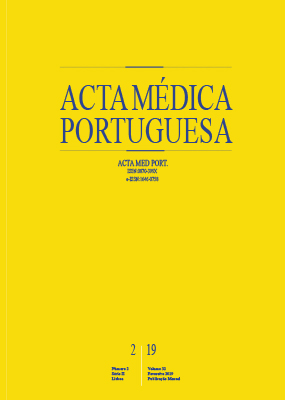General Public’s Knowledge Regarding Basic Life Support: A Pilot Study with a Portuguese Sample
DOI:
https://doi.org/10.20344/amp.10971Keywords:
Cardiopulmonary Resuscitation/education, Health Knowledge, Attitudes, Practice, Life Support SystemsAbstract
Introduction: Basic life support is a key manoeuvre in a cardiac arrest situation that can often save a victim’s life. This study investigates the general public’s knowledge about the fundamentals of basic life support, and its association with previous training/education on basic life support and self-perception of knowledge. A secondary goal is to assess the opinion on training needs.
Material and Methods: This is a cross-sectional, exploratory, and descriptive study, using a convenience sample of 655 individuals. A survey containing 21 questions was applied. A descriptive and inferential statistical analysis explored potential associations between variables.
Results: The mean score for general knowledge (75.9% ± 14.2%) was statistically significantly higher (p < 0.001) than for technical knowledge (31.2% ± 29.7). Considering the overall knowledge, the mean score was 49.0% ± 20.3%, with 100 (15.3%) respondents scoring equal or higher than 70%, and only 12 (1.8%) answering all questions correctly. Less than 30% of the sample had previous training in basic life support.
Discussion: The source of knowledge and time elapsed from previous training have relevant and statistically significant associations with the knowledge scores. Association of the self-perception of knowledge and the actual scores showed, in general, that participants have a correct perception of their knowledge. The knowledge scores indicate clear lack of training and knowledge among the general population.
Conclusion: The results of this study reinforce the need for practical and regular basic life support training, ideally early in life and in the workplace. Participants recognize that they have residual or low basic life support knowledge and are motivated to attend training and refresher courses.
Downloads
Downloads
Published
How to Cite
Issue
Section
License
Copyright (c) 2019 Acta Médica Portuguesa

This work is licensed under a Creative Commons Attribution-NonCommercial 4.0 International License.
All the articles published in the AMP are open access and comply with the requirements of funding agencies or academic institutions. The AMP is governed by the terms of the Creative Commons ‘Attribution – Non-Commercial Use - (CC-BY-NC)’ license, regarding the use by third parties.
It is the author’s responsibility to obtain approval for the reproduction of figures, tables, etc. from other publications.
Upon acceptance of an article for publication, the authors will be asked to complete the ICMJE “Copyright Liability and Copyright Sharing Statement “(http://www.actamedicaportuguesa.com/info/AMP-NormasPublicacao.pdf) and the “Declaration of Potential Conflicts of Interest” (http:// www.icmje.org/conflicts-of-interest). An e-mail will be sent to the corresponding author to acknowledge receipt of the manuscript.
After publication, the authors are authorised to make their articles available in repositories of their institutions of origin, as long as they always mention where they were published and according to the Creative Commons license.









